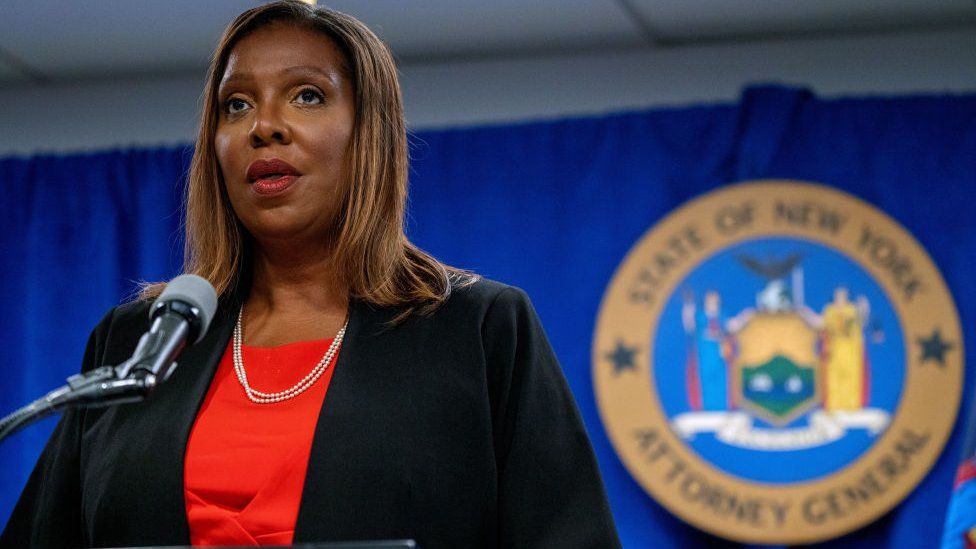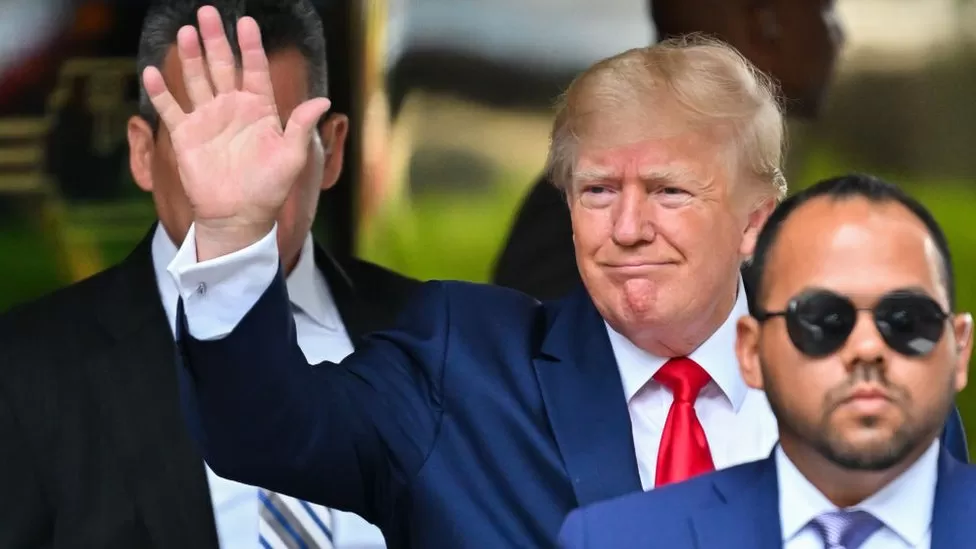Former US President Donald Trump has declined to answer questions as part of a New York state investigation into his family’s business practices.
Mr Trump had sued in an effort to block the interview at the New York attorney general’s office on Wednesday.
State officials accuse the Trump Organization of misleading authorities about the value of its assets in order to get favourable loans and tax breaks.
Mr Trump denies wrongdoing and has called the civil probe a witch hunt.
An hour after he was pictured arriving at the Manhattan office where he was questioned under oath, Mr Trump released a statement in which he criticised New York Attorney General Letitia James and the broader investigation.
“Years of work and tens of millions of dollars have been spent on this long simmering saga, and to no avail,” he said. “I declined to answer the questions under the rights and privileges afforded to every citizen under the United States Constitution.”
Ms James’ office confirmed that the interview took place on Wednesday and that “Mr Trump invoked his Fifth Amendment right against self-incrimination”.
“Attorney General James will pursue the facts and the law wherever they may lead,” the statement added. “Our investigation continues.”
His deposition comes just days after the FBI executed an unprecedented search warrant at his Florida estate, Mar-a-Lago, as part of a separate investigation that is reportedly linked to his handling of classified material.
While the attorney general’s investigation is a civil one, a parallel investigation is being carried out by the Manhattan District Attorney’s office which could result in criminal charges.
Legal analysts suggest Mr Trump may have declined to answer questions on Wednesday because his answers could have been used against him in that criminal investigation. The former president invoked the Fifth Amendment, which protects people from being compelled to be a witness against themselves in a criminal case.
Trump on people pleading the Fifth Amendment: ‘Disgraceful’
The questioning lasted around four hours, and included lengthy breaks, his lawyer Ronald Fischetti told US media.
Mr Trump began by reading a statement into the record condemning the attorney general and her investigation and invoking his Fifth Amendment rights.
He proceeded to say “same answer” to every question he was asked.
Ms James’ office has said that the depositions – a legal term that means testimony not given in court – were among the last remaining investigative procedures to be carried out.

Once the investigation concludes, the state attorney general could decide to bring a lawsuit seeking financial penalties against Mr Trump or his company.
Ms James had sought Mr Trump’s deposition – and that of two of his children, Ivanka and Donald Trump Jr – for more than six months while the family resisted subpoenas through the New York court system.
Lawyers for Mr Trump had also attempted to sue Ms James in a bid to prevent her from questioning the former president and his children.
But in February, a New York Supreme Court judge ruled that all three must sit for depositions. Ivanka and Donald Trump Jr were questioned earlier this month.
The judge said the investigation had uncovered “copious evidence of possible financial fraud” giving the attorney general a “clear right” to question under oath the former president and two of his children involved in the business.
Ms James hailed the judge’s decision as a victory, saying that “justice has prevailed”.
The investigation, which was first opened in 2019, seeks to prove that Mr Trump and the Trump Organization misrepresented the value of assets in order to obtain favourable loans and tax breaks. The alleged fraud is said to have taken place before Mr Trump took office.


“The mob takes the Fifth,” Donald Trump said at an Iowa campaign rally in 2016.
His target? You’ve guessed it – Hillary Clinton. Some of her former staffers had exercised their right to silence during a congressional inquiry.
The boot is now on the other foot, as they say.
“I once asked,” said his statement on Wednesday – published while his deposition by the New York attorney general was still ongoing – “If you’re innocent why are you taking the Fifth Amendment?”
“Now I know the answer to that question,” he concluded, suggesting that he had been left with no choice.
There are parallels here – in terms of Mr Trump’s response – with the separate investigation into his handling of official documents, thought to have been the reason for the recent search of his Florida estate.
While his allies have been demanding answers from officials over the unprecedented action, he could choose to provide some himself. That’s because he’ll have a copy of the warrant and the inventory of material removed from his property.
Yet his public statements suggest he’s been left in the dark, and he has repeatedly attacked the process.
His supporters may believe the narrative that he is being persecuted. But – as Trump himself once did – others may see his refusal to answer questions as a sign there’s substance to the case against him.
Trump’s other legal battles:
- Earlier this week, the FBI searched Mr Trump’s home in Mar-a-Lago, reportedly in connection with his handling of classified records.
- A House of Representatives select committee is investigating his actions surrounding the US Capitol riot on 6 January 2021 – when his supporters rioted at Congress in Washington DC as lawmakers met to certify Mr Biden’s election victory
- The justice department is examining his challenge to the results of the 2020 presidential election
- A prosecutor in Fulton County, Georgia, is investigating whether Mr Trump and his associates tried to interfere in that state’s results from the election
- A federal appeals court ruled on Tuesday that lawmakers can gain access to Mr Trump’s tax records, affirming the decision of a lower court
- Read more: How big are Trump’s legal problems?
Source: BBC News


